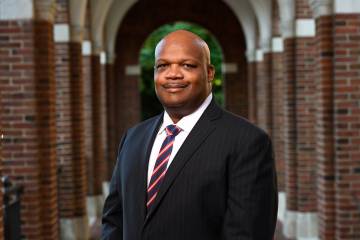Five Johns Hopkins University affiliates nominated to fill vacancies on the Johns Hopkins Police Accountability Board received unanimous approval from the Maryland Senate last week, clearing the way for them to join the 15-member board at the beginning of the 2022-23 academic year.
The accountability board will help directly shape the development and operation of the future Johns Hopkins Police Department.
"I'd like to thank the new members of the accountability board for their willingness and commitment to do this important work," said Branville Bard, vice president for public safety for Johns Hopkins. "As we set out to build a new model for policing—one that is transparent and accountable to the community it serves—the accountability board will be a key partner and ensure that we are meeting not only the requirements in the law but our commitments to the community as well."
The new members, selected in the fall from a group of 30 applicants, are:
- Elise Favia, Graduate student, Education, Johns Hopkins Engineering for Professionals program (Student)
- Thomas C. Judge, Executive Assistant, Department of Epidemiology, Bloomberg School of Public Health (Staff)
- Terri Massie-Burrell, Senior Director of Student Disability Services, Johns Hopkins University, Homewood campus (Staff)
- Katie O'Conor, Fellow, Emergency Medicine-Anesthesiology Program, School of Medicine (Faculty)
- Michael Wilkinson, PhD student, Department of Mechanical Engineering, Johns Hopkins University (Student)
"Serving on this board is an honor and a privilege—to be a voice of advocacy and to give back to the communities that have shaped my personal and professional life," said O'Conor, who served on the board previously and reapplied for a new term after a change in her role at the university. "As a Baltimore native, community advocate, and physician, I am deeply invested in the safety, physical health, and emotional wellbeing of our city. Our board embraces this historic opportunity to create a modern model of community-centered collaborative public safety, amplifying the priorities and goals of historically marginalized groups and guiding the new public safety team to serve these communities' priorities."
Massie-Burrell, also a Baltimore native, said she was inspired to apply to the accountability board by the service of longtime family friend and Hopkins employee Yvonne Theodore, who died in 2017. Theodore spent nearly three decades at JHU, in the human resources division as director of the university's affirmative action program and coordinator for disability services, where she advocated for diversifying the university's student, staff, and faculty populations.
"I think of the dedication of Miss Yvonne in her role and also my mom's career as a retired equal employment opportunity officer for the federal government—it has been a motivator for me as a professional," said Massie-Burrell, senior director of student disability services at the Homewood campus. "I am delighted to have the opportunity to continue their legacy. Advocacy is my passion, and I am fully committed to this work on the board. JHU is an important part of this community at-large and has the capacity to do an amazing job policing this community and continuously improve."
Created by the Community Safety and Strengthening Act in 2019, the accountability board is a 15-member body made up of three community members unaffiliated with the university and 10 JHU students, faculty members, and staff—including at least one member of the university's Black Faculty and Staff Association—drawn from across the three campuses where the future JHPD will operate: East Baltimore, Homewood, and Peabody. The remaining two seats are appointed by Baltimore's mayor and city council president, respectively.
Accountability board members are charged with sharing community feedback with Johns Hopkins leadership, reviewing metrics involving crime, and assessing department policies, procedures, and training in order to provide recommendations for improvement, including ideas for community-based public safety initiatives. Non-student accountability board members serve for two years, while student members serve for one year and must be enrolled for the duration of their term.
Though the development of the JHPD is still on hold, Bard reconvened the accountability board in December as part of his listening tour with the Hopkins and Baltimore community. He has called the accountability board an invaluable tool for the university in ensuring that the Hopkins and Baltimore communities' values and input are considered for public safety more broadly, and from the beginning of the department's creation.
More information about the accountability board can be found on the Public Safety website, which includes a form for ideas and feedback.
Posted in University News
Tagged public safety









